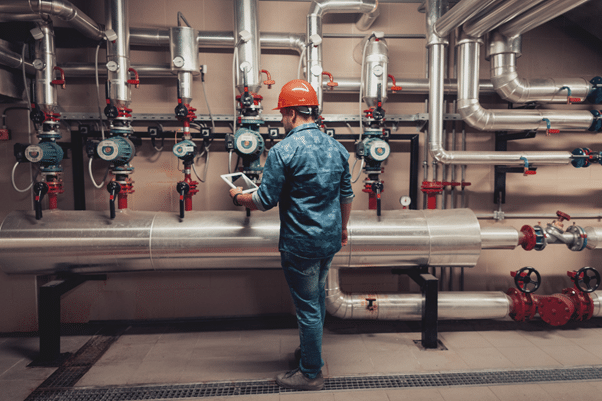Commercial boilers are highly advanced pieces of kit and, for the most part, they run smoothly and reliably. However, problems do sometimes occur – and this can include a rise or fall in pressure within the system. If this happens, you might find that your industrial boiler stops working properly, potentially leaving you without heating and hot water. In a scenario like this, it may be necessary to arrange boiler hire.
The good news is, fixing commercial boiler pressure is often straightforward. Depending on the cause of the problem, you might be able to do this yourself. Alternatively, it may be necessary to call a suitably qualified engineer. In this post, we look at the steps you can take if your commercial boiler pressure is too low or high, and we offer advice on how to maintain the appropriate pressure in your heating system.
How to fix boiler water pressure

Before you attempt to fix the pressure, you’ll of course need to know what the problem is.
Low pressure
Low pressure can occur because of water or steam leakage within the system. A leak may only be very small, but over time it could cause your heating system to lose a considerable amount of pressure. A drop in pressure can also happen if you have recently bled your radiators, or because of problems with components in the return system, such as valves or feed pumps.
To find out if the pressure is too low, check the pressure gauge on your boiler control panel. If the reading is less than the minimum pressure as stated in the manufacturer’s manual, carefully follow the instructions to repressurise the system – providing it is safe to do so. If it is not safe for you to perform this procedure yourself or you don’t feel confident taking the necessary actions, call an engineer to do this for you. The precise steps you will need to take to repressurise the system will depend on the type of commercial boiler you have.
If your boiler maintains the desired pressure after it has been repressurised, you shouldn’t have to take any further steps. If it doesn’t, there is probably a leak somewhere in the system or a faulty component, meaning you will need to get an engineer to take a look.
High pressure
Alternatively, your industrial boiler problems may be caused by excessive pressure. For example, this may happen if you recently repressurised the system and overestimated how much water was needed. It could also be a result of a faulty pressure relief valve (PRV) or a filling loop that has been left slightly open, meaning new water is continually entering the system.
Check the pressure gauge to confirm if your heating system is operating under excess pressure. If it is, you can look for possible problems with components such as the PRV or filling loop. It might be necessary to get a heating engineer to do this for you. Depending on the cause of the high pressure, potential fixes can include bleeding radiators, replacing the PRV or closing the filling loop.
How to maintain water pressure in boiler
The best way to keep the water pressure in your commercial boiler at the right level is to schedule regular servicing and maintenance. This will ensure that any problems are picked up on and fixed as soon as possible, including possible leaks in the system and faults with valves or other components that can affect boiler pressure.
During a service, the engineer will conduct a number of assessments to make sure that your boiler is working as it should. This includes looking at the appliance itself (including all internal and external components), the pipework and the flue. They should detect issues that can cause pressure to rise or fall too much.
As well as helping you to maintain the correct pressure in your boiler, regular servicing will keep your appliance working as effectively and efficiently as possible, and it will help to maximise its lifespan. Check your boiler manual to see how often it should be serviced. Usually, it is recommended to arrange a service at least once a year.
It’s important to be aware that no matter how careful you are with your commercial boiler, there is always a risk that it will break down or require scheduled repairs. In instances like this, you may need to rely on either emergency or planned commercial boiler hire to ensure you aren’t left without heating and hot water.